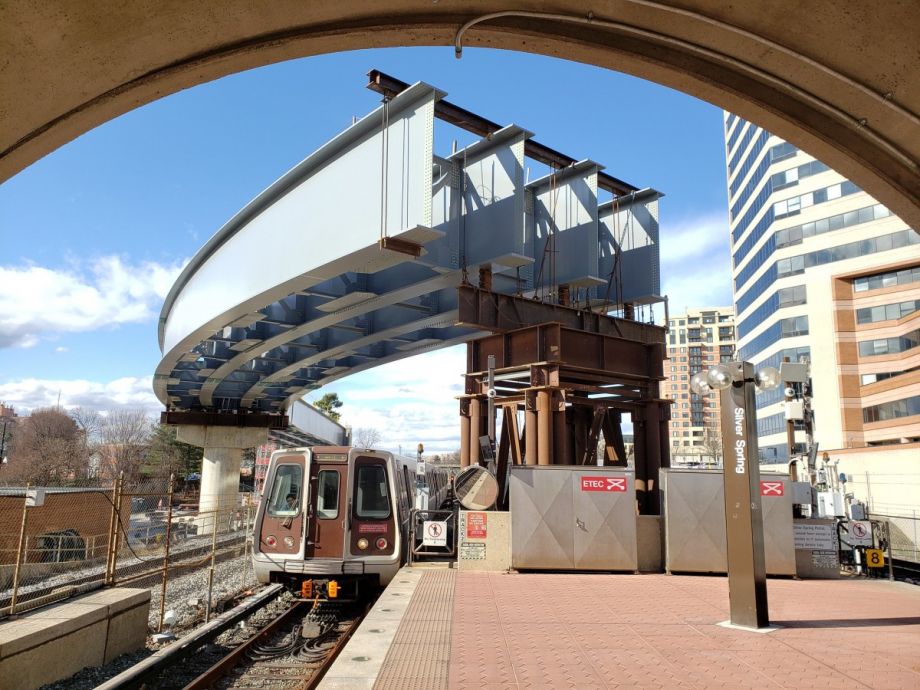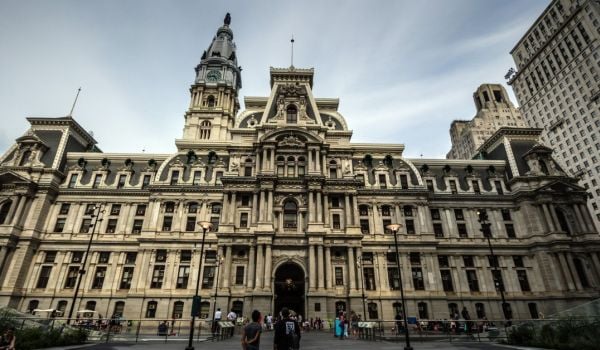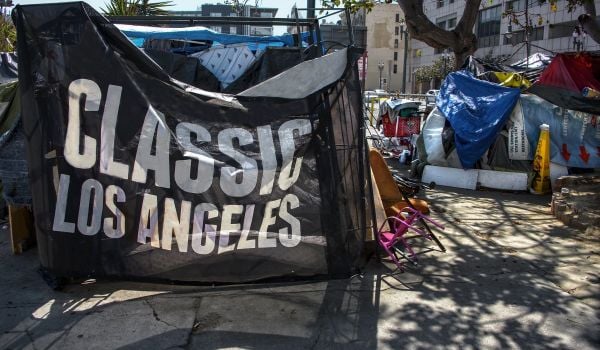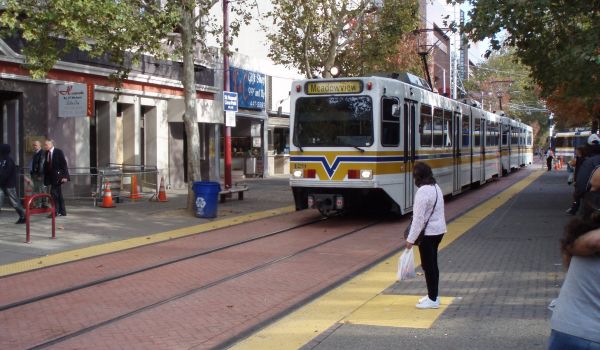Welcome to “The Mobile City,” our weekly roundup of newsworthy transportation developments.
The long feud over cost overruns that threatened to derail progress on the Purple Line light rail construction project in Washington’s Maryland suburbs came to an amicable end last week with the announcement of a $250 million out-of-court settlement between the feuding parties. The settlement clears the way for a new team of private companies to oversee construction, which the state of Maryland had threatened to take over.
Meanwhile, the electric-bike revolution is moving into new territory with the development of e-bikes that can haul sizable cargo loads. These vehicles hold promise for local delivery of goods, but for now, the first models will be used by Portland city employees to test their suitability for various hauling purposes.
And microtransit continues to expand its reach, this time as transit agencies struggle to right-size their services in the face of falling ridership and revenue. The latest expansion comes in St. Louis, which has contracted with Via to provide on-demand transit service to poorly served parts of St. Louis County since June. Now the transit vans will take over service on two regular bus routes where ridership has declined.
Maryland Settles with Purple Line Construction Partners, Clearing Way for New Partnership
A seven-month standoff over construction cost overruns on the Purple Line light rail transit project in Washington’s Maryland suburbs came to an end Nov. 24 with the announcement of an out-of court settlement that will allow the state of Maryland to turn the project over to a new private consortium to finish.
DCist reports that under the terms of the settlement, Maryland will pay $250 million to Purple Line Transit Partners, the consortium of three private companies that had been building the line, as settlement of all outstanding financial claims.
The feud between the state and its contractor began in May when the partnership announced it wanted out of the project. That triggered suits and countersuits over some $800 million in construction cost overruns arising from design changes and delays caused by other lawsuits. During the dispute, Maryland announced that it would seek another contractor or even manage the construction project itself.
The settlement allows Maryland to hand the project over to a new private-sector partnership consisting of two of the original three companies in PLTP, Star America and Meridiam. Fluor, the original third company, chose to exit the partnership.
Both Maryland Gov. Larry Hogan and a coalition pushing for the line’s completion praised the settlement. The advocacy group, Purple Line Now, said in a statement that “a negotiated outcome between Maryland and the Purple Line Transit Partners was always the fastest way back on track and we are most thankful.”
The $5.6 billion Purple Line project is one of the largest public-private partnership construction projects in the country. The Purple Line, which will run in an arc through Montgomery and Prince George’s counties, was originally set to open in 2022, but the delays and overruns have pushed the completion date back to 2024 at the earliest.
Portland City Workers to Give E-Cargo Bikes a Test
As cities around the country set ambitious goals for reducing vehicle emissions, a new tool is emerging that can help them reach those goals: the e-cargo bike with a larger carrying capacity. Smart Cities Dive reports that the company that designed this bigger e-cargo bike is talking its vehicles to a second city for further testing.
After a four-month test run in Madison, Wis., Saris Infrastructure is taking the large-capacity e-bikes to Portland for city workers to use. The bike — actually, a trike — has a cargo hold in front that can be reconfigured depending on the task it will perform. In Madison, city workers used the bikes to transport landscaping equipment and haul yard waste.
Users can adjust the pedal assistance depending on the weight of the cargo, and the bikes’ two 500-watt batteries last for 30 to 50 hours of service. The batteries can be recharged from a standard electrical outlet with no special infrastructure needed.
Besides emissions reductions, other benefits of using e-bikes for municipal cargo-hauling include the ability to hire a wider range of workers for delivery jobs. E-bike riders need no driver’s license to use the vehicles.
Saris developed its e-bike design in partnership with Bosch and cargo-bike manufacturer Urban Arrow. Even though the bikes being used in the pilot projects are designed specifically for municipal government use, Saris Infrastructure director Mike Basarich says the bikes have many other potential uses, such as grocery or package delivery, and that both businesses and individuals would find them useful for hauling items in cities. Saris plans to sell the bikes to the general public beginning this coming February.
Microtransit to Replace Mass Transit on St. Louis-Area Bus Routes
Microtransit has gained traction as a means to both make mass transit service more flexible and responsive and extend it to areas buses can’t serve effectively. Now, at least one metropolitan area is turning to it as a way to preserve transit service in the face of slumping ridership.
The St. Louis Post-Dispatch reports that Metro Transit in Missouri and the St. Clair County Transit District in Illinois will each convert one of their lightly used suburban bus routes to transit-on-demand service. In Missouri, the route being converted connects several destinations in and around Fenton in southwest St. Louis County; in Illinois, the vans will replace a bus route that runs between Lebanon and Mascoutah, two communities east of Scott Air Force Base and St. Louis Mid-America Airport on the suburban fringe.
The Fenton service will be operated under the Via Metro STL banner. This service launched in northern and southern. St. Louis County in June. The new service will also extend beyond the territory of the 101 Fenton Connector bus by connecting riders to Shrewsbury MetroLink rail station in West County, which the discontinued bus line also served. In St. Clair County, the service will operate as part of the SCCTD VanGo service, which began operation Oct. 19.
Metro and SCCTD officials told the Post-Dispatch that the changes allow their agencies to operate more efficiently and respond to changing demand. Unionized bus drivers who had operated service on the bus routes were less sanguine; Reggie Howard, president of Amalgamated Transit Union Local 788, said he worried that expansion of the Via contract service could lead to the loss of union jobs. Metro’s Dial-a-Ride paratransit service uses union members, and Howard said he felt these services should also use union operators. Metro Executive Director Jessica Mefford-Miller responded that while fiscal realities meant that her agency could not continue to operate service the way it had been doing, “the overwhelming majority of Metro services are and will likely be provided by our … professional ATU bus and van operators.”
Know of a project that should be featured in this column? Send a Tweet with links to @MarketStEl using the hashtag #mobilecity.

Next City contributor Sandy Smith is the home and real estate editor at Philadelphia magazine. Over the years, his work has appeared in Hidden City Philadelphia, the Philadelphia Inquirer and other local and regional publications. His interest in cities stretches back to his youth in Kansas City, and his career in journalism and media relations extends back that far as well.
Follow Sandy .(JavaScript must be enabled to view this email address)







_600_350_80_s_c1.jpg)








